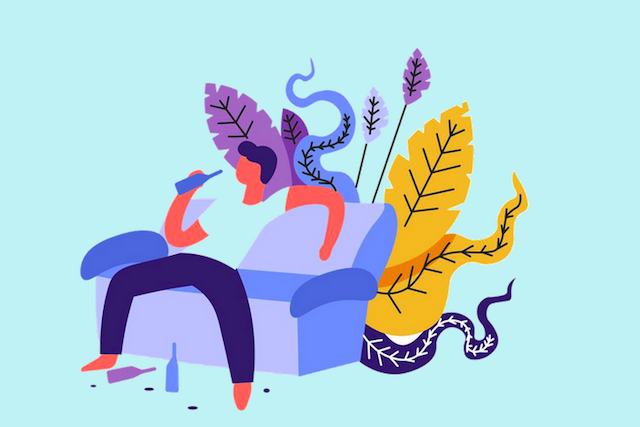
“Be the person who breaks the cycle. If you were judged, choose understanding. If you were rejected, choose acceptance. If you were shamed, choose compassion. Be the person you needed when you were hurting, not the person who hurt you. Vow to be better than what broke you—to heal instead of becoming bitter so you can act from your heart, not your pain.” ~Lori Deschene
Take a moment to look around where you are right now. Look at the people surrounding you, whether you’re in your office, a waiting room, or the line at the post office.
Statistically, one out of every eight American adults in your space is suffering with a substance abuse disorder.
This person could be your next-door neighbor, your family doctor, your teacher, or a co-worker.
Out of more than 15 million people struggling, less than 8% reportedly have received treatment, according to the National Institute of Alcohol Abuse and Alcoholism.
Television shows and movies often lead us to believe that the people who suffer from addiction are the homeless, jobless people on the street who beg for money to feed their habit.
In some circumstances, this unfortunately is true, but I’ve learned that addiction can also be found in the people around you in your day-to-day life. Addiction doesn’t care which zip code you live in or what skin color you have. It doesn’t matter how much money you have in your bank account or what kind of position you hold within a company.
I was around five or six years old when I first recognized that my dad had a problem. I didn’t know what the word “addiction” meant; however, I knew his actions made me feel that our family was different than others.
It would be summertime and I would see neighbors sitting outside laughing together and barbecuing, and being that it was starting to get late in the day, my dad had already drank a few too many and would be inside for the night.
The National Institute on Drug Abuse estimates that a quarter of children in the U.S. grow up in households where there is substance abuse.
Growing up with a parent who has an addiction isn’t easy. You see them transform into a different person before your eyes. Within hours. You wonder why they choose to spend time with the addiction instead of with you.
You can cry, scream, and slam your bedroom door to try to make a point of how much it hurts you, but it never seems to be enough. And it doesn’t mean this person doesn’t love or care about you, although it can make you feel that way.
At a young age, I remember experiencing the ups and downs of a parent with an addiction. Each day would be different than the last. Some days he would joke and laugh, and others, we would do anything to avoid him because we knew he’d take out on us the weight of whatever he had been carrying that day.
My dad was considered a “functioning alcoholic.” I don’t recall him ever missing one day of work, even when he had the flu or after spraining his ankle.
By trade, he was a carpenter and scaffolder, and to this day, he is the hardest working man I’ve ever known. He’d wake up before the sun to get to work so he could provide for us. He went above and beyond to care, love, and protect us, but after a certain time of day, we knew that would all come to an end.
The classic picture of an alcoholic is someone who drinks too much and whose life is falling apart because of it. But that’s not always reality.
A functioning alcoholic might not act the way you would expect them to act. They might be responsible and productive. They could even be a high achiever and in a position of power. In fact, their success might lead people to overlook their drinking.
Alcohol and drugs steal away the person you love. They rob you of time you should be spending with them. They turn them into someone else—a person who says and does hurtful things. And in turn, you might say hurtful things back. Not because you want to, but because you simply don’t know what else to do. You begin thinking of what you can do to turn this person around. What will make them stop?
I grew up with a parent who had an addiction to numbing his feelings.
There were times when he would open up briefly about the hardships he had experienced growing up and how hurt and angry they made him feel. Rather than forgiving those who’d caused him pain, to free himself of what he kept bottled up inside, he would drink to relieve it.
It hurts to see someone you love hurting. It hurts to not know what to do to help them.
My dad never admitted to having a problem. Not once. Not even when we poured the cans of beer we’d found down the sink and he became excessively angry.
Admitting to having a problem is the first step, and the next would be to make a change. And it wasn’t something he believed he could do.
Sometimes it feels easier to stay the same than do what’s needed to rid yourself of the addiction. You feel ‘safe’ where you are, and you can easily justify maintaining the status quo. My dad had a job, a family, a nice home. In his mind, why would he need to change? That wasn’t what rock bottom looks like. So everything must have been fine how it was.
I recently heard a story by Kirk Franklin:
“Two twin boys were raised by an alcoholic father. One grew up to be an alcoholic and when asked what happened he said, ‘I watched my father.’ The other grew up and never drank in his life. When he asked what happened he said, ‘I watched my father.’ Two boys, same dad, two different perspectives. Your perspective in life will determine your destination.”
I was a young girl when I realized that I had two choices when it came to my dad’s addiction: to forgive or to hold onto the hurt, as I saw him do. I saw what it looked like to hold on to anger and resentment, so I decided that no matter what my dad might say or do, I would show forgiveness.
This wasn’t easy because at the end of the day, you just want that person to stop, but I chose to focus on the dad I had when he wasn’t under the influence of alcohol. The dad who would shoot hoops with me in the backyard, who would fill the oil up in my car without asking if I needed it, who would keep letters I wrote to him in the pocket of his jeans years after I had given them to him.
I’ve learned that it is our decision to create the life we want to live and the mindset we want to have. I could have held on to the hurtful things my dad said or how he refused to get help. But I believe we have the power to overcome any circumstance by focusing on what lifts us up rather than what pulls us down.
“I am not what happened to me. I am what I choose to become.” ~Carl Jung
Today I am choosing to share my story with you as a way to honor my dad, who kept himself in a cage for his entire life. Was it out of fear of judgment or discomfort? I’m not sure. But I do know for the last twenty-nine years, I’ve been conditioned to do the same.
The stigma related to addiction causes us to feel shame. And I have felt shame for having a parent who had this disease. We keep our stories inside because we are afraid of how people will view us or our loved one. But in reality, it’s sharing that sets us free—free to make a difference in the life of someone else who is struggling.
Today is the day I open the door to my own cage, after nearly thirty years, to set myself free and break the cycle. I hope that my story will connect with someone who needs it—a person who, like me, has buried their past deep inside and pushes forward, not realizing the power and strength found in release.
I also hope to shed some light on what it’s like to struggle with addiction, based on my observations of my father, because I believe we’re better able to help the people we love when we let go of these common myths:
Addicts can stop if they want to.
Research shows that long-term substance use alters brain chemistry. These changes can cause intense cravings, impulse control issues, and the compulsion to continue to use. Due to these chemical changes, it is very difficult for a true addict to quit solely by willpower and determination.
Addiction only affects those who are weak, uneducated, or have low morals.
Addiction does not discriminate. It affects people of all ages, ethnicities, cultures, religions, communities, and socioeconomic statuses. Addiction is not a result of low morals, though often addicts behave in ways that violate their personal beliefs and values. Addiction is an equal opportunity disease.
Addiction is a disease, so there is nothing you can do about it.
If your doctor told you that you had cancer, would you not begin the necessary treatment and make the necessary lifestyle changes? Addiction isn’t much different if you believe in the research that suggests that addiction is a disease of the brain.
Just because you have the disease of addiction doesn’t mean you throw in the towel. Research shows that the brain damage resulting from substance use can sometimes be reversed through abstinence, therapy, and other forms of treatment.
Addicts who relapse are hopeless.
Addiction is a chronic disorder. Addicts are most prone to relapse in the first few months of being clean and sober. A relapse does not constitute failure.Processing the events surrounding a relapse can be healthy and aid in preventing future relapses.
Alcohol and drug use cause addiction.
There are several factors that contribute to a person becoming addicted. While alcohol and drugs may trigger a substance use problem for some, there are those who can drink alcohol and experiment with drug use and never become addicted. Factors that contribute include environment, emotional health, mental health, and genetic predisposition.
Addicts should be excused from negative behaviors.
Some may believe since addiction is a disease, addicts should not be held accountable for their actions. This is not true. An addict may not be responsible for their disease, but they are responsible for their choices and their recovery.
—
It’s easy to judge and criticize what we don’t understand. You don’t have to walk a mile in an addict’s shoes to understand addiction and addictive behaviors. You just have to educate yourself and want to help so you can break the cycle of pain. And remember: whether you’re an addict or you love one, there’s nothing to be ashamed of, and you are not alone.
About Ashley Sword
Ashley Sword is the founder of For the Good, a site that was created to share uplifting messages as a means of filling people up in a deeper, meaningful way. She’s currently forming For the Good workshops and events across the country. If you’re interested in partnering, click here to connect.













 Though I run this site, it is not mine. It's ours. It's not about me. It's about us. Your stories and your wisdom are just as meaningful as mine.
Though I run this site, it is not mine. It's ours. It's not about me. It's about us. Your stories and your wisdom are just as meaningful as mine.
Thanks for sharing your story.
Forgiveness – the fine art of being with someone where they are at while maintaining healthy boundaries. I think it is in those moments when we are challenged to hold those tensions that we become truly conscious of what it means to Love. Well done!
Thank you and its very important to let people know their not alone.Iam child of alcoholic my mother has been a functioning alcoholic for over 20 years and now she is older this has it problems.I am now having to care for her and she can say mean things when she is drunk.But I look at it as she living with such pain and I am not going to be that person .I will find the joy in life and love her in her pain .I learned to love and forgive .I have also learned I am enough and I can set boundries with this alcoholic .I also have learned to have healthy relationships with other people is not to live in shame being open to tell and talk about this elephant in room has free me from pain.Lots of love and peace Joc
This article really touched me as I fully understand addiction. I have an addiction though it does not involve a substance. I don’t want to do what I do and feel ashamed afterwards. Countless times I have stopped and vowed never to do this again yet after a few days I crave the hign. It is such a release but then I feel ashamed again. Thus the cycle continues and has done for many years.
I was brought up by 2 functioning alcoholics. My Dad ran his own computer software company and my Mum was a director of the company too. They were both intelligent, well dressed people. They were from working class backgrounds, but had fought their way to the middle class and deserved it.
Sadly, even though they both knew they had a serious problem, my Mum was never ready to address it. She was a fantastic person, and they both loved my older sister and I. But the trauma must have been too deep. Almost 5 years ago she had an accident at home due to being drunk, and died. She was an alcoholic before I was born, drank through the pregnancy, and only got worse throughout my life. But I still love them both (Dad died a few years ago from Alzheimer’s). I drink very occasionally. I don’t need to completely avoid it to stay in control, but I definitely would not want the life that they led.
Addiction isn’t a disease. 🤦♀️ And the terms ‘recovery’ and ‘clean and sober’ make me cringe, all these labels and acting like you have to be in ‘recovery’ your entire life is why people start drinking again in the first place. Just realise there is no benefit to drinking alcohol, quit and be done with it, then say you don’t drink any poison. None of this recovery bs, you’re setting yourself up for failure by saying you’re in recovery. I quit drinking 2 years ago, I don’t say I’m in recovery. I say I’m free. Anyone who drinks is dependent on it to some extent, just that ‘alcoholics’ (a made up term which makes no logical sense) are far more dependent on it.
Sorry if this comment came across as rude. This is just my approach and opinions as someone who has quit drinking and I personally find the idea of ‘recovery’ unhelpful. I understand it may work for others.
My dad was an alcoholic, I always thought that if I will find a guy, he will be totaly different. With one I was right, his addiction is totaly different, he’s a high functioning alcoholic. Addiction to everything, not only to the alcohol, is a problem, this we know. We can look at this in a fourfold way from Buddhism (but not limited to this approach). The Fourfold Truths align with the medical perspective and states that if there is a problem, then there is always a reason for it; the problem can be solved and there are specific steps to take in order to do so. These principles can be easily adapted to alcoholism. From the very beginning that it is doable and feasible to help an alcoholic you love. There is a great book about this approach – net-bossorg/how-to-help-an-alcoholic-you-love and it helped me to find a way how to speak with my husband, especialy that his way of addiction doesn’t looks like a typical drunkard. He was not getting hammered, but he was drinking everyday and he had to drink at least a beer in the evening… after I knew how to speak with him, he got himself up, and went for a therapy. It’s getting better now 🙂
Thank you very much for recommending a guide by Ellen Petersen. I was completely devastated by the situation with my husband, but after reading this book I knew what to do and so far we have been successful. Keep your fingers crossed that it stays that way. Thank you again for recommending the guide